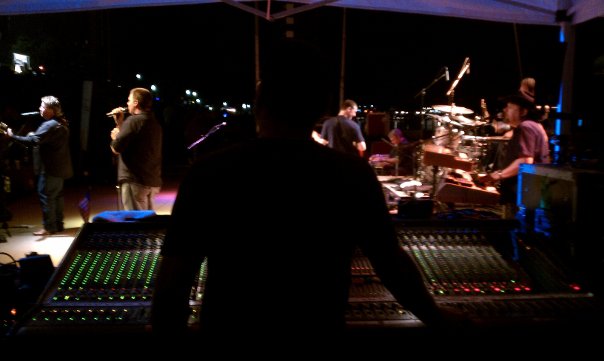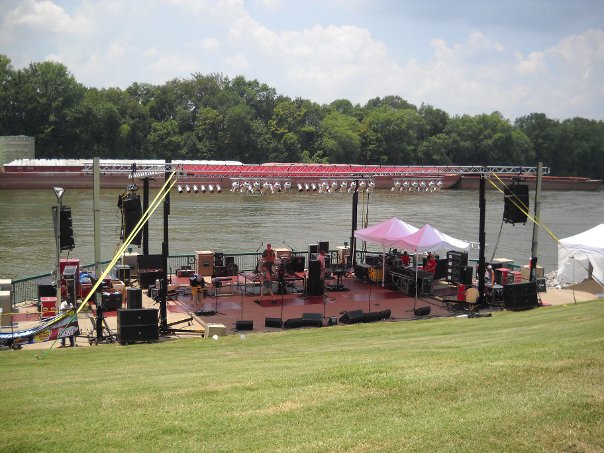
When you go to a concert, it seems there’s an element of magic to the event. The music, the lighting, the vibe being built ahead of time. It all combines to bring the fans the best show possible. It lets those in attendance leave their “real lives” behind for awhile and take in this electricity. It seems almost surreal when all is done just right.
But what many don’t realize is that for those who bring the show to the fans, this is the JOB. They may not go to a corner cubical every day. They may not get up and go to work at 8 am then come home at 5 pm. However, all other elements of a job exist… along with a few other stressors no one with a “day job” ever has to deal with.
“The office building” is the arena or theater or night club or field in which the show is taking place. “The office” is where you stand when you play your instrument, or where you run sound or lights. When you are keeping over the front of house guy’s shoulder, its about like when someone pokes their head in your office to see what you are doing.
You have a boss or two keeping an eye on things at all times. There are company policies to follow, and occasionally you do have “a board meeting” in which the state of the “company” is discussed. You can get fired for not doing your job or breaking the rules, and there is often a dress code you follow on-stage.
On show days there are certain jobs that must be done to make the show happen. Unload the trailer or semis. Set up the stage and instruments. Set up the lighting and video boards, if the artist carries those. Run a sound check (something that I personally have found to be infinitely boring). Then you may or may not have hours off before the show. Every day is different regarding “down time.” You have to find time to eat somewhere in there. Catch a shower and maybe a nap, because chances are you’ve not had much sleep.
If you have multiple shows in a row, its almost guaranteed that at some point you’ll go to bed around 4 am, and you’ll have to be unloading the trailer by 8 AM ready for another full, 20-hour day. (FYI: sometimes when you go to a large festival, what you don’t see is that under the stage there are hammocks where people try to grab a fast nap between sets.)
When you do get to sleep, you sleep with all your co-workers only feet away. Who needs a water cooler when you can just stick your head out of your bunk and probably reach out and grab the person you want to talk to? There is very little privacy on a tour bus!

Your bed, bathroom and living room moves as you travel from point A to point B. Every curve and pot hole jostles you awake, or lulls you to sleep. Every time someone pulls out in front of the bus, anyone sleeping is disrupted. Heaven help you if you’re trying to pour a cup of morning coffee. (Its like my husband says in good humor when he is driving bus: Truckers can go fast and take curves on two wheels all they want. THEIR cargo doesn’t fuss them for spilling their drinks!)
Its always good to see familiar faces on the road. Especially when its a long run that takes you away from home, a friendly (and different!) face can really rejuvenate the road-weary soul. However, guests need to always remember… its a day of fun for the guest, but its a work-day for the musician or crew member. They can’t go run around and party when there is work that has to be done for the show to happen.
The show can last anywhere from half an hour to several hours depending on the set-up, crowd and artist’s mood. (Yes, I have been to shows that have lasted upwards of three hours because it just felt right to keep going.) And while people may go, “Oh you get paid for that half hour you played.” In reality, you get paid for putting in a 20-hour work day. You get paid for representing the artist at all times during that day. You get paid to be available any time there is a show to be done.
The perks of the job are, of course, doing what you love, seeing the country and meeting thousands of fascinating people, and sometimes having four or five days off during the week to be at home. The downside is indeed sometimes running on no sleep, being away from your family for days (weeks or even months!) at a time, and the industry being “feast or famine” — you work like crazy in the summer making money, then come winter the shows are scarce and so is the money.
I recently saw where a friend said, “The music thing is the worst thing you can do and the best thing you can do.” I thought that summed it up really well! I think anyone who truly loves their job, anyone blessed to do what they enjoy and love for a living, could probably agree with that sentiment. You wouldn’t trade the job and experiences for anything, but when you break it all down… it really is a job. One that you are good at (or you wouldn’t be out there!), enjoy, and that needs to be done.

